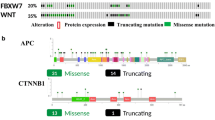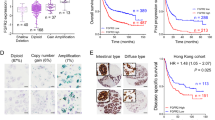Summary
Tivantinib has been described as a selective inhibitor of c-Met and is being studied in various types of cancer. In this study, we evaluated the effects of tivantinib on the suppression of gastric cancer (GC) cell migration and apoptosis. We also examined the mechanism of action of tivantinib by oncogenic pathway analysis. We applied an RNA-sequencing approach in 34 GC patients to identify oncogenes that are differentially expressed in GC tissues. To examine the inhibitory effect of tivantinib on GC cells, we conducted apoptosis analysis using an annexin V-APC/PI apoptosis detection kit and trans-well migration assay with human GC cell lines. For oncogenic pathway analysis, Western blot and quantitative real-time PCR analysis were used to detect the expression of proteins and genes before and after tivantinib exposure. In the RNA-sequencing analysis of 34 GC patients, c-Met and VEGFA genes were expressed and positively correlated with each other. Cell migration and apoptosis analysis demonstrated that tivantinib induced the best inhibition effect in SNU620, MKN45 (carries VEGFB mutation), AGS, and MKN28 cells, but not in KATO III (carries VEGFB and VEGFC mutations) cells. Oncogenic pathway analysis showed that tivantinib, in addition to c-Met signaling pathway inhibition, also inhibits VEGF signaling and MYC expression in VEGFA-expressing GC cells. We found that tivantinib has anti-cancer activity not only in GC cells overexpressing c-Met but also in non-c-Met GC cells by inhibition of the VEGF signaling pathway.






Similar content being viewed by others
References
Global Burden of Disease Cancer Collaboration, Fitzmaurice C, Allen C, Barber RM, Barregard L, Bhutta ZA et al (2017) Global, regional, and national cancer incidence, mortality, years of life lost, years lived with disability, and disability-adjusted life-years for 32 cancer groups, 1990 to 2015: a systematic analysis for the global burden of disease study. JAMA Oncol 3:524–548
Jung KW, Won YJ, Kong HJ, Lee ES (2019) Cancer statistics in Korea: incidence, mortality, survival, and prevalence in 2016. Cancer Res Treat 51:417–430
Smith MG, Hold GL, Tahara E, El-Omar EM (2006) Cellular and molecular aspects of gastric cancer. World J Gastroenterol 12:2979–2990
Gherardi E, Birchmeier W, Birchmeier C, Vande Woude G (2012) Targeting MET in cancer: rationale and progress. Nat Rev Cancer 12:89–103
Maroun CR, Rowlands T (2014) The met receptor tyrosine kinase: a key player in oncogenesis and drug resistance. Pharmacol Ther 142:316–338
Lee J, Seo JW, Jun HJ, Ki CS, Park SH, Park YS, Lim HY, Choi MG, Bae JM, Sohn TS, Noh JH, Kim S, Jang HL, Kim JY, Kim KM, Kang WK, Park JO (2011) Impact of MET amplification on gastric cancer: possible roles as a novel prognostic marker and a potential therapeutic target. Oncol Rep 25:1517–1524
Graziano F, Galluccio N, Lorenzini P, Ruzzo A, Canestrari E, D’Emidio S et al (2011) Genetic activation of the MET pathway and prognosis of patients with high-risk, radically resected gastric cancer. J Clin Oncol 29:4789–4795
Munshi N, Jeay S, Li Y, Chen CR, France DS, Ashwell MA, Hill J, Moussa MM, Leggett DS, Li CJ (2010) ARQ 197, a novel and selective inhibitor of the human c-met receptor tyrosine kinase with antitumor activity. Mol Cancer Ther 9:1544–1553
First-line treatment for locally advanced or metastatic mesenchymal epithelial transition factor (MET) - positive gastric, lower esophageal, or gastroesophageal junction (GEJ) adenocarcinoma. Available from: https://clinicaltrials.gov/ct2/show/NCT01697072. Accessed October 7, 2019
A phase 3 study of rilotumumab (AMG 102) with cisplatin and capecitabine (CX) as first-line therapy in gastric cancer. Available from: https://clinicaltrials.gov/ct2/show/NCT02137343. Accessed October 7, 2019
A study of onartuzumab in combination with mFOLFOX6 in participants with metastatic HER2-negative and MET-positive gastroesophageal cancer. Available from: https://clinicaltrials.gov/ct2/show/NCT01662869. Accessed October 7, 2019
Rimassa L, Assenat E, Peck-Radosavljevic M, Pracht M, Zagonel V, Mathurin P, Rota Caremoli E, Porta C, Daniele B, Bolondi L, Mazzaferro V, Harris W, Damjanov N, Pastorelli D, Reig M, Knox J, Negri F, Trojan J, López López C, Personeni N, Decaens T, Dupuy M, Sieghart W, Abbadessa G, Schwartz B, Lamar M, Goldberg T, Shuster D, Santoro A, Bruix J (2018) Tivantinib for second-line treatment of MET-high, advanced hepatocellular carcinoma (METIV-HCC): a final analysis of a phase 3, randomised, placebo-controlled study. Lancet Oncol 19:682–693
Basilico C, Pennacchietti S, Vigna E, Chiriaco C, Arena S, Bardelli A, Valdembri D, Serini G, Michieli P (2013) Tivantinib (ARQ197) displays cytotoxic activity that is independent of its ability to bind MET. Clin Cancer Res 19:2381–2392
Katayama R, Aoyama A, Yamori T, Qi J, Oh-hara T, Song Y, Engelman JA, Fujita N (2013) Cytotoxic activity of tivantinib (ARQ 197) is not due solely to c-MET inhibition. Cancer Res 73:3087–3096
Xiang Q, Zhen Z, Deng DY, Wang J, Chen Y, Li J et al (2015) Tivantinib induces G2/M arrest and apoptosis by disrupting tubulin polymerization in hepatocellular carcinoma. J Exp Clin Cancer Res 34:118
Calles A, Kwiatkowski N, Cammarata BK, Ercan D, Gray NS, Jänne PA (2015) Tivantinib (ARQ 197) efficacy is independent of MET inhibition in non-small-cell lung cancer cell lines. Mol Oncol 9:260–269
Yap TA, Olmos D, Brunetto AT, Tunariu N, Barriuso J, Riisnaes R, Pope L, Clark J, Futreal A, Germuska M, Collins D, deSouza NM, Leach MO, Savage RE, Waghorne C, Chai F, Garmey E, Schwartz B, Kaye SB, de Bono JS (2011) Phase I trial of a selective c-MET inhibitor ARQ 197 incorporating proof of mechanism pharmacodynamic studies. J Clin Oncol 29:1271–1279
Kang YK, Muro K, Ryu MH, Yasui H, Nishina T, Ryoo BY, Kamiya Y, Akinaga S, Boku N (2014) A phase II trial of a selective c-met inhibitor tivantinib (ARQ 197) monotherapy as a second- or third-line therapy in the patients with metastatic gastric cancer. Investig New Drugs 32:355–361
Pant S, Patel M, Kurkjian C, Hemphill B, Flores M, Thompson D, Bendell J (2017) A phase II study of the c-met inhibitor tivantinib in combination with FOLFOX for the treatment of patients with previously untreated metastatic adenocarcinoma of the distal esophagus, gastroesophageal junction, or stomach. Cancer Investig 35:463–472
Acknowledgements
We would like to thank the patients and all of the investigators who participated in these studies. The authors were fully responsible for all content and editorial decisions, and were involved at all stages of manuscript development.
Funding
This research was supported by the National R&D Program for Cancer Control, Ministry of Health and Welfare (HA17C0054), the National Research Foundation of Korea grant funded by the Korean Ministry of Science and ICT (NRF-2017R1A2B4005055), the Ministry of Food and Drug Safety of Korea (awarded in 2018, 18183MFDS491), and the Hallym University Research Fund. These funding sources had no role in the design of the study, writing of the manuscript, or the collection, analysis and interpretation of the data.
Author information
Authors and Affiliations
Contributions
All authors contributed to the study conception and design. Material preparation, data collection and analysis were performed by BJ Kim, YJ Kim and S Sohn. All authors participated in writing the first draft of the manuscript and commented on subsequent versions of the manuscript. All authors read and approved the final manuscript.
Corresponding author
Ethics declarations
Conflict of interest
The authors have no conflicts of interest to disclose.
Ethical approval
The use of human tissues in this study was approved by the Ethics Committee of Hallym University Sacred Heart Hospital.
Informed consent
Informed consent was obtained from all individual participants included in the study.
Additional information
Publisher’s note
Springer Nature remains neutral with regard to jurisdictional claims in published maps and institutional affiliations.
Bum Jun Kim, Yoo Jin Kim and Sung-Hwa Sohn should be considered as co-first authors.
Rights and permissions
About this article
Cite this article
Kim, B.J., Kim, Y.J., Sohn, SH. et al. Tivantinib inhibits the VEGF signaling pathway and induces apoptosis in gastric cancer cells with c-MET or VEGFA amplification. Invest New Drugs 38, 1633–1640 (2020). https://doi.org/10.1007/s10637-020-00940-3
Received:
Accepted:
Published:
Issue Date:
DOI: https://doi.org/10.1007/s10637-020-00940-3




